Emotion & Stress Physiology Laboratory
Our Research
The Emotion and Stress Physiology (ESP) lab is an extension of the Adult Development and Aging lab dedicated to the scientific study of stress and coping. Questions that drive our research include What are the strategies individuals use to successfully manage stress? Who do these strategies work for? How do these strategies work and why?
We use an emotion regulation framework to answer these questions by examining how coping strategies can be used to alter emotional reactivity to stress as well as the concomitant physiological response. By using a multi-method approach that integrates behavioral, neuroendocrine (i.e., hormones), and psychophysiological data we aim to better understand how emotion-focused coping can “get under the skin” to have downstream effects on physiological reactivity. Our work incorporates indices representative of both the hormonal (i.e., HPA-axis) stress response and the autonomic nervous system (e.g., heart rate) to develop a comprehensive understanding of the ways in which emotion regulation may aid in the regulation of stress systems. Examining how these mechanisms change with, or as a result of, coping with stress will improve our understanding of how these changes promote long-term resiliency to stress, particularly as it relates to the etiology and maintenance of mood-related pathology (e.g., depression).
Recently, our work has also begun to examine how emotion and cognition interact to influence memory. In close collaboration with the Sleep, Stress and Memory lab directed by Dr. Jessica Payne SAM lab, we are currently examining how emotion-focused coping modulates subsequent emotional memory. We are particularly interested in assessing how down-regulating affective responses modulates physiological arousal to either improve or worsen memory. We are also interested in the temporal dynamics of the emotion regulation and memory interaction, and aim to better understand how the influences of emotion-focused coping on memory unfold over time.
Lab Director
 Cindy Bergeman
Cindy Bergeman
Graduate Students Undergraduate Research Assistants
 Brandy Martinez
Brandy Martinez
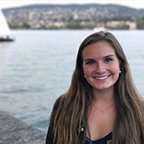 Katherine Salley
Katherine Salley
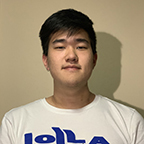 Bryan Min
Bryan Min
 Jenna Meyers
Jenna Meyers
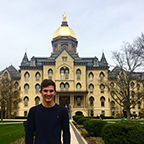 Jack Harness
Jack Harness
 Abigail Rice
Abigail Rice
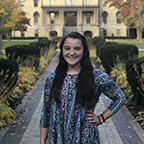 Julie Rosta
Julie Rosta
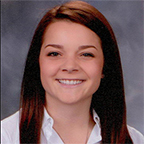 Alecca Como
Alecca Como
Representative Research
In The News
Notre Dame’s Association for Women in Science hosts inaugural graduate student conference
Q&A with Brandy Sky Martinez, Ph.D. student in psychology
Publications
Gaffey, A. and Martinez, B. 2019. Neuroendocrine Mechanisms of Psychological Stress: Age Differences in Adults. In Oxford Research Encyclopedia of Neuroscience. Oxford University Press. doi:10.1093/acrefore/9780190264086.013.280.
Posters
- Martinez, B. S., Bergeman, C. S., Wirth, M. M. (September 2017). Examining the “Undoing Hypothesis” in a community sample via multilevel moderation analyses, Poster, The International Society for Psychoneuroendocrinology Annual Conference, Zurich, Switzerland.
- Koscielski, M. C.*, Bergeman, C. S., Martinez, B. S., Joiner, R., Wirth, M. M. (September 2017). The longitudinal implications of stress dissipation on pathophysiological mechanisms, Poster, The International Society for Psychoneuroendocrinology Annual Conference, Zurich, Switzerland.
- Martinez, B. S., Bergeman, C. S., & Wirth, M. M. (September, 2016). Examining religious coping as a stress-mitigating emotion regulation strategy, Poster, Women in Science Conference, Notre Dame, IN
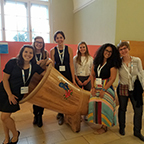 ISPNE conference from 2017 when the lab traveled to Zurich
ISPNE conference from 2017 when the lab traveled to Zurich
Alumni
Allison Gaffey, Ph.D; Fellow, Cardiovascular Behavioral Medicine, Yale University School of Medicine
Amy Ahn - Icahn School of Medicine at Mount Sinai, NYC, New York
Anne Bode - Equity Research Product Management Analyst for Wells Fargo Securities
Andrew Recker – Wake Forest School of Medicine
Emma Rowland
Joshua Tadevich
Marissa Koscielski - Engineering, Science, & Technology Entrepreneurship Excellence (ESTEEM) Master's Program, U. Notre Dame
Michael Markel – Georgetown University School of Medicine
Natalie Jackson - Vanderbilt School of Medicine
Natalie Pottschmidt - gap year before Ph.D. program; lab manager position in Jake Michaelson's lab at the University of Iowa
Sierra Muir - Duke University School of Medicine; Physical Therapy Division
Madison Ratycz
Maggie Li
Megan Covington
Sarah Owens - Ph.D. program in Clinical Psychology, University of North Carolina - Chapel Hill
John Cassano
Kenneth Colon
Tom Lienhoop - Feinburg School of Medicine, Northwestern University
Nicole Villa - Dual program in Public Health and Latin Studies, San Diego State University
Catherine Buckley
Erica Mitchell
Elizabeth Palmer
Molly Partusch
Ryan Tixier
Jaclyn Bowe
Christina BuchananKelsey Christoffel - University of Minnesota Medical School
Chiamaka Esomonu
Victoria Fischer - Master's Program in Physical Sciences, University of Chicago; Georgetown University School of Medicine; Army Health Professions ScholarshipChristopher Green - Rush Medical College
Cristina Kline-Quiroz - Philadelphia College of Osteopathic Medicine
Rebecca Marton
Kelly Miller
Eunice Park
Kathleen Poploski - University of Pittsburgh, DPT Physical Therapy
Wyatt Smith
Mark Tancredi - Stritch School of Medicine - Loyola University Chicago
Christine Wu - Research Assistant position at University of Houston, supervised by Dr. Qian Lu